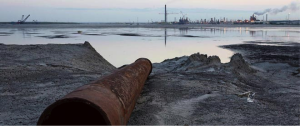
The Albertan oilsands have always been controversial on the basis of their harmful environmental impact, however recently; First Nations have made accusations proclaiming that the oilsands have corrupted their water and air quality. Melanie Dene was quoted in The Star stating that “nobody else but the First Nations seems to care about the water in the river,” this calls into question the responsibility of oil companies to contain their hazardous chemicals. The article in The Star also sheds light on the issue of ethical responsibility in the oilsands, and who is liable to restore the local environment. Milton Friedman argues that the sole concern of a firm is to maximize profit; in this mindset, oil businesses should completely disregard their environmental impact. Unfortunately, by Friedman’s thinking, this puts the First Nations directly in the way of the oil industry’s pursuit of profit, leading to the current situation wherein they’re being ignored. Thus one can see the necessity for intervention, whether that comes from the government or the oil and gas industry, it doesn’t matter. The ethical implications of these companies earning profit whilst also ignoring their impact on the communities around them is not only a statement on the social implications of the oilsands, but even larger, a statement on the treatment of First Nations in a capitalist economy. In summary, there is an ethical responsibility for the oil and gas industry to take an active role in remediating the damage they’ve done to the first nation’s communities affected by their pollution.
The Star article: http://www.thestar.com/news/atkinsonseries/2015/08/28/first-nations-bear-the-risks-of-oilsands-development.html